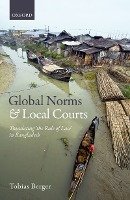What happens to transnational norms when they travel from one place to another? How do norms change when they move; and how do they affect the place where they arrive? This book develops a novel theoretical account of norm translation that is located in between theories of norm diffusion and norm localization. It demonstrates how such translations do not follow linear trajectories from 'the global' to 'the local', rather, they unfold in a recursive back and forth movement between different actors located in different context. As norms are translated, their meaning changes; and only if their meaning changes in ways that are intelligible to people within a specific context, the social and political dynamics of this context do change as well. This book analyses translations of 'the rule of law', focusing on contemporary donor-driven projects with non-state courts in rural Bangladesh, and shows how in these projects, global norms change local courts -- but only if they are translated, often in unexpected ways from the perspective of international actors. Based on extensive fieldwork, this book reveals how grassroots level employees of local NGOs significantly alter the meaning of global norms -- for example when they translate secular notions of the rule of law into the language of Islam and Islamic Law -- and only thereby also enhance participatory spaces for marginalized people.

